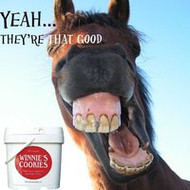The Importance of Keeping up with your Horse’s Dental Hygiene
Posted by Winnie's Cookies on 5th Dec 2023
Many owners take considerable pains to address their horse's healthcare, but may be ignoring their horse's dental hygiene, which could lead to problems. Horses' teeth never stop growing, so problems associated with their teeth are not uncommon. By inspecting your horse's teeth on a regular basis, you can actually enhance your horse's overall health and well-being.
Dental Problems and Your Horse's Health
By inspecting your horse's teeth and mouth on a regular basis, you can guard against a variety of problems associated with poor dental care and insufficient hygiene. Neglecting your horse's teeth could result in a tooth problem that causes your horse discomfort while chewing. If you see your horse drop a considerable amount of feed while eating or turning its head to a certain side as it chews, that could be evidence of a dental problem. Some horses may even refrain from eating altogether. Before you chalk this up to a lack of appetite, be sure to have your horse's mouth checked.
Another problem you may discover is that your horse will pass a substantial amount of undigested grains if it isn't able to chew adequately. Undigested grains mean that your horse isn't getting the nutrients it needs for optimum health. If your horse's coat or health condition seems to be in decline, it could also indicate a tooth problem. Other signs that your horse has a dental issue include behavioral problems, head tossing, colic, or avoidance of its bit. You may also notice a decrease in your horse's athletic ability. Tooth problems present themselves in a variety of ways, so regular checks can make a huge difference in their well-being.
Dental Exams
Equine veterinarians recommend that horses have their teeth checked when they are yearlings. From that point on, they suggest that owners have their horses' teeth checked every six months. The dentist will ensure that the horse's teeth are not growing uneven, which could affect its ability to grind its food. Edges of the horses' teeth can also become sharp and cut the cheeks and gums of the horse as it chews, which can cause sores or even mouth ulcers. The horse's mouth also needs to be checked for missing teeth that can occur during a fall or trauma. The tooth opposite to a missing tooth's gap will have nothing to wear against and so it will continue to grow and affect the horse's ability to eat and could even alter jaw movement.
Dental Procedures
It's customary for a horse's dental checkup to vary with age. Because older horses invariably exhibit more dental problems than young horses, older horses often require various types of procedures. One of the most common procedures veterinarians will do for horses (usually age three and older) is known as "floating." In this procedure, the vet will file the sharp areas of the horse's teeth and smooth their edges. Other common procedures include equilibration, correction of malocclusions, and bit seats.
You can protect your horse's teeth and overall health by monitoring you’re your horse’s mouth and scheduling regular dental exams. If you notice problems like those indicated above, you should consider that there could be a dental problem and you consult your veterinarian for a check up.

